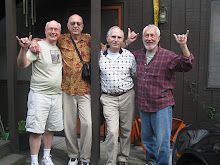The Mighty Ones
It is getting harder to stand here
each year. I must have been here for 125 years.
Why, I remember when I could
look over east and see nothing but tall grass and buffalo. And I could see some
of my relatives, some really old timers and some youngsters and all ages in between. We would wave to each other each morning as the sun peeked up.
But there aren't many of us anymore. There surely aren't any buffalo.
I heard a story about how I got here. You see, with all this yummy
soil between here and the lakes called the Great Lakes, lots of my relatives
settled these areas. We came from the east and the winds carried our seeds high
in the air. The seeds have something like the feathers of my friends, the
birds. The seeds look, I am told, like little puffs of cotton. I guess that's
why I am called a cottonwood tree.
Anyway, we are a
proud family. We towered over the land and could watch all that was happening.
My grandparents produced a lot of seeds over there by those big lakes and some
of the seeds blew to about halfway between where they stood and where I stand,
into an area called by people, Minnesota. That was many summers ago.
And then my parents produced seeds that blew in the
winds from the east over to where I now am. So there were several of us that
sunk our feet into the rich loam of these prairies. And, as I said before,
there are precious few of us left.
What happened to all of my relatives? Why, I've heard
that about 75 to 125 summers ago, as people were moving into this area, they
would cut us down for our fine wood to make long, straight and strong timbers.
For their barns to help shelter their cattle and horses. And for their sheds to
protect their chickens and pigs. And to make parts for machinery so they could
cut this beautiful grass to feed their cattle and horses. And to make machines
to break up the soil so they could plant something called wheat and corn and
oats and barley. It always made me sad to see more of my gentle neighbor
grasses disappear. The grasses were beautiful and smelled so good. And my
friends the birds- pheasants, meadow larks, robins, crows, blackbirds,
sparrows, owls and many others- they all made their homes in the grasses and
would feast on the grasshoppers and other insects they
found in the grasses.
But, alas, killing my neighbor grasses is what people
call progress. Little do the people see what I see from way up here. The way
the soil that I thrive on and the people plant their wheat and stuff in - the
way the dear soil now gets washed away by the water from the clouds and blows
away by the strong winds from where the snow comes. It makes me sad. And more and more of my distant relatives - other
trees - are getting cut down so more corn and wheat and stuff can be planted.
And it is we, the strong and mighty ones, with our feet firmly in the soil, we
are the ones that stand up to the winds and weaken them so they don't blow the
soil or blow down their barns. And now we are so few....
I'm happy for that little boy person who comes to sit
at my feet and hugs me and listens to me. I am getting so lonely. And I’ve been
telling him about what it’s like to be a mighty cottonwood tree.
By JD Thompson




